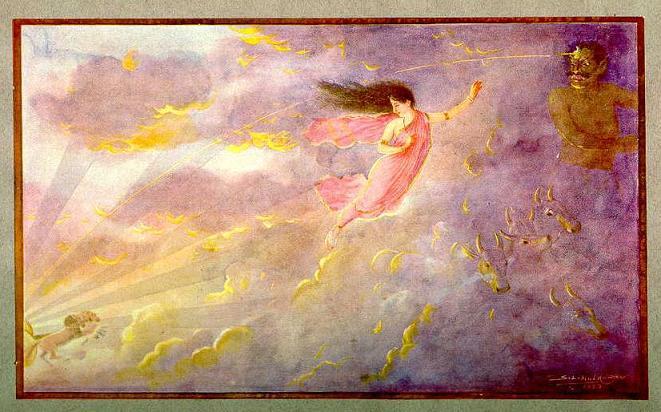srigurubhyO namahA |
With the 187th mantrA, the sage begins the sub section detailing the transitoriness of life and teaches us the best way to utilise this momentary life.
With the 187th mantrA, the sage begins the sub section detailing the transitoriness of life and teaches us the best way to utilise this momentary life.
5. உயிர் நிலையாமை
தழைக்கின்ற செந்தளிர்த் தண்மலர்க் கொம்பில்
இழைக்கின்றது எல்லாம் இறக்கின்ற கண்டும்
பிழைப்பின்றி எம்பெரு மானடி ஏத்தார்
அழைக்கின்ற போதுஅறி யாரவர் தாமே. I.5.1.187
இழைக்கின்றது எல்லாம் இறக்கின்ற கண்டும்
பிழைப்பின்றி எம்பெரு மானடி ஏத்தார்
அழைக்கின்ற போதுஅறி யாரவர் தாமே. I.5.1.187
5 TRANSITORINESS
OF LIFE
They see the sprouting wanton buds on tender twigs
They see the sprouting wanton buds on tender twigs
They see how soon they flash their beauty and die;
Yet they seek not the Holy Feet;
Alas they know not when the sure call comes from High. I.5.1.187
Yet they seek not the Holy Feet;
Alas they know not when the sure call comes from High. I.5.1.187
Com - They see the sprouting wanton
buds on tender twigs Though the tender (young and full of life) twigs of
the flowering shrubs are possessed of beautiful shoots and leaves and the most
pleasant flowers They see how soon they flash their beauty and die; all that which
sprouted, budded and blossomed does very soon wither and perish. This is
plainly visible for all to see. Yet they
seek not the Holy Feet; Even still, the ignorant (most of us, really) do
not attempt to utilise the time that we have life in this body to seek the Holy
Feet of the Lord (i.e. self knowledge). Alas
they know not when the sure call comes from High. Sadly, they do not
realise that one day when the call comes from yama (death) , as surely it will someday, they will be unable to
contemplate the supreme Lord at that late hour.
*As
this is the subsection dealing with the transitory nature of life, the sage
brings to our attention the momentary appearance of the leaves and flowers and
their subsequent decay. Though the
momentary nature of life is evident from even the most cursory look at the world
around us, in our ignorance we continue to while away the precious little time
we have here by being occupied with everything apart from seeking self
knowledge and fulfilling the very purpose of life. And those that have not been
able to seek and meditate on the Lord while alive, would indeed find it very
difficult to seek Him when they have but a few breaths left at the end of time.
Thus one must utilise this life, however momentary to seek the Lord and obtain
His grace.
thirucchitramabalam ||
